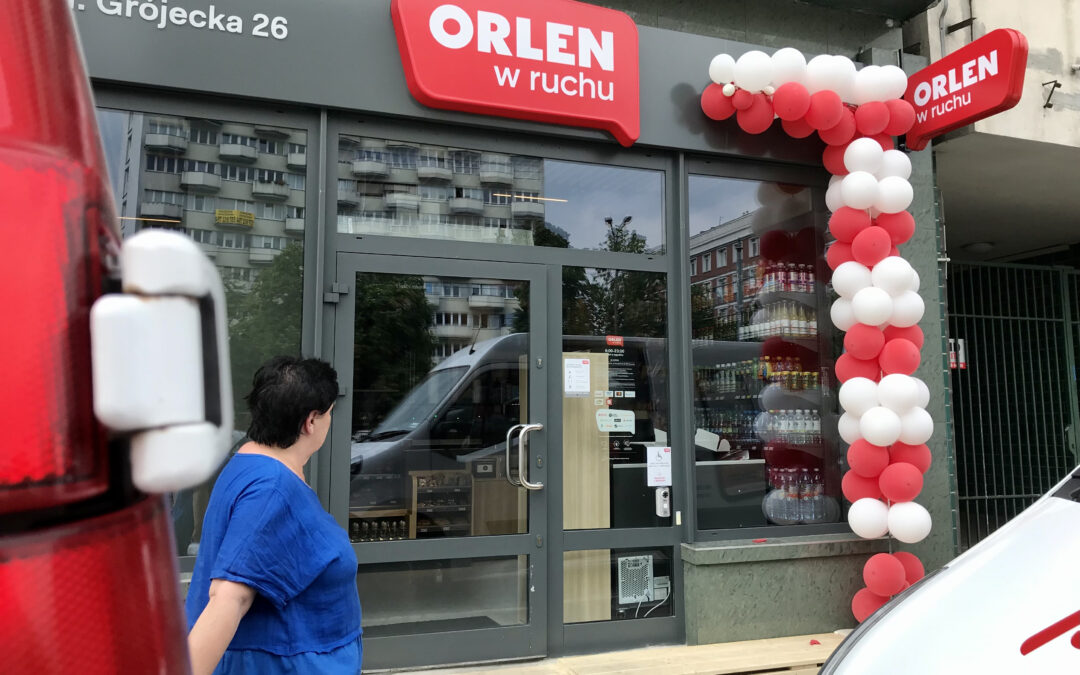Poland’s state-owned oil giant PKN Orlen, which runs a large network of petrol stations, today launched its first stand-alone store. It aims to open hundreds more over the next five years.
The new format is part of a push by the company – which is Poland’s largest by revenue – to diversify into retail, courier services and parcel lockers in response to falling demand for oil. Orlen has pledged to invest 11 billion zloty (€2.4 billion) by 2030 to build up its retail network.
Its latest foray follows the recent purchase of hundreds of local media outlets. Orlen has argued that that move is also part of the new business strategy, but critics claim that the firm – whose CEO, Daniel Obajtek, is close the ruling Law and Justice (PiS) party – has political motives.
Poland’s state-owned oil giant @PKN_ORLEN opened its first new format store (not at one of its petrol stations) today as part of a retail diversification effort.
There were six employees at the checkout, and newsletters, cakes and bottles were very pedantically laid out pic.twitter.com/sodMFmCulZ
— Maria Wilczek (@mariawilczek) June 23, 2021
The new stores are called “Orlen w ruchu”, which means “Orlen on the go” but also refers to Ruch, a press distributor purchased by Orlen in 2020. The one opened today in central Warsaw offers pre-packed as well as hot snacks and drinks, plus a newspaper stand operated by Ruch.
Speaking at the launch of the outlet on Wednesday morning, Obajtek said that the company had plans to open 40 more by the end of the year and at least 900 by 2026.
“This is an element of the development of our non-fuel offer,” said Obajtek. He said that the company hoped that annual operating profit from the segment would reach more than 5 billion zloty (€1.1 billion), up from the current 3 billion zloty (€663 million).
Patrycja Klarecka, a management board member responsible for retail, told state broadcaster TVP that the next outlets would open in the cities of Bydgoszcz and Wrocław, followed by Lublin, Katowice, Zabrze and Bytom. They will each span either 20 or 60-70 square metres.
“We closely follow all consumer trends,” said Klarecka, explaining that the new format was based on the company’s analysis of the market. Orlen already runs a few hundred convenience stores (O! Shop) at its petrol stations.
Poles have increasingly turned to shopping at convenience and discount stores, rather than supermarkets and small shops. Twice as many shops closed in 2020 as in the previous year, with small grocery stores, kiosks and megastores particular affected.
In November, Orlen announced that it would be creating a network of 2,000 automated parcel lockers, thus entering a market dominated by home-grown player InPost, which by the end of last year already had 1,000 such lockers around Poland.
The company has also unveiled plans to invest in a courier service with about 5,000 pick-up and drop-off points, reports Reuters.
More contentiously, Orlen earlier this year completed the 120 million zloty purchase of Polska Press, which owns 20 of Poland’s 24 regional daily newspapers, 120 regional weeklies, and hundreds of websites.
In April, a court ordered Orlen to suspend the takeover in response to a case filed by the human rights commissioner, who argued that it constituted an “unacceptable restriction on freedom of the press”. The firm has rejected such concerns as “unfounded” and pushed ahead with changes at Polska Press.
Main image credit: Maria Wilczek

Maria Wilczek is deputy editor of Notes from Poland. She is a regular writer for The Times, The Economist and Al Jazeera English, and has also featured in Foreign Policy, Politico Europe, The Spectator and Gazeta Wyborcza.




















